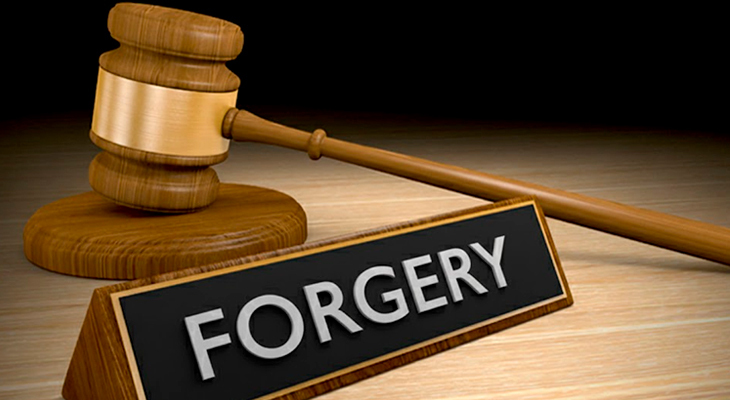
You’ve just been handed a letter at work saying you’re being investigated for altering a company document. Panic sets in. You didn’t think that editing a few lines in a contract or signing on someone’s behalf without telling them could lead to criminal charges. But in Alberta, it can, and it’s called forgery.
Whether the document was used or not, the intent to pass it off as genuine could land you in serious legal trouble. So what exactly counts as forgery, and how can you protect yourself if you’ve been charged?
This blog breaks it all down in clear terms, what forgery means under Canadian law, what the prosecution must prove, and why having a trusted forgery lawyer can make all the difference.
The Legal Definition Of Forgery In Canada
In Canada, forgery is covered under Section 366 to Section 368 of the Criminal Code of Canada. According to Section 366(1):
Everyone commits forgery who makes a false document, knowing it to be false, with intent
(a) that it should in any way be used or acted on as genuine, to the prejudice of anyone; or
(b) that a person should be induced, by the belief that it is genuine, to do or to refrain from doing anything.
In plain language, forgery involves the creation, alteration, or use of a document with the goal of deceiving someone. Even if the document isn’t used, preparing it with the intent to fool someone can still lead to criminal charges.
Common Types Of Forged Documents
Forgery applies to a wide range of documents, not just cheques or bank papers. Below is a quick reference table outlining common forged documents:
| Document Type | Examples |
| Financial | Cheques, bank drafts, invoices |
| Legal/Personal | Wills, contracts, marriage certificates |
| Identity | Driver’s licences, passports, SIN cards |
| Academic/Professional | Transcripts, diplomas, resumes |
| Immigration | Visas, permits, sponsorship documents |
Charges can arise from many personal or professional situations, making it critical to understand the risks.
What The Crown Must Prove In A Forgery Case
To secure a conviction for forgery under Section 366 of the Criminal Code of Canada, the Crown must prove each of the following elements beyond a reasonable doubt:
A False Document Was Made Or Altered
The prosecution must show that the document in question was either fabricated or materially altered in a way that misrepresents its authenticity.
Knowledge That The Document Was False
It’s not enough that the document was forged, the accused must have known it was false at the time they made or used it. Innocent mistakes, like typos or clerical errors, typically don’t qualify.
Intent To Use The Document As Genuine
There must be a clear intent to deceive. The person must have prepared or used the document expecting others to treat it as real, which could lead to action or prejudice against someone else.
Intent To Cause Harm Or Induce Action
The document must have been used (or intended to be used) to gain an unfair advantage, cause financial harm, or manipulate someone’s decisions, whether or not the outcome occurred.
This legal framework was affirmed in R v. Théroux, [1993] 2 SCR 5, where the Supreme Court of Canada held that intent to deceive is central to many fraud-related offences. The mens rea (guilty mind) must align with the act of fraud.
If even one of these elements is not proven, the charge cannot stand in a Canadian court.
Common Defences Against Forgery Charges
A well-structured legal defence focuses on breaking down one or more of the required elements for a conviction. Here are the most effective defences used by a skilled forgery lawyer:
1. Lack Of Intent To Deceive
If the accused did not intend for the document to be taken as genuine, even if it was technically altered, then the charge may not apply. Intent is the cornerstone of a forgery case.
2. Lack Of Knowledge That The Document Was Forged
Sometimes people unknowingly use or handle documents that are already forged. If the Crown can’t prove the accused was aware the document was false, it becomes very difficult to secure a conviction.
3. No Use Or Attempt To Use The Document
While simply creating a false document can be enough to trigger charges, prosecutors often seek to show it was intended for use. Demonstrating that the forged item was never shared, sent, or acted upon can work in the accused’s favour.
4. Another Party Was Responsible
Forgery cases often arise in environments where multiple individuals have access to the same documents. A defence may involve proving someone else altered or used the document without your knowledge or participation.
5. Violation Of Charter Rights
If the police obtained evidence in violation of your Charter rights, for example, through an illegal search or coercive questioning, your forgery lawyer can move to have that evidence excluded under Section 24(2) of the Charter.
These defences are not one-size-fits-all. A strong legal strategy will depend on the specific facts, documents involved, and actions taken by law enforcement. That’s why early consultation with a criminal defence lawyer is essential.
When To Call A Criminal Law Firm
If you’ve been accused of forgery in Alberta, take it seriously. Criminal records don’t go away easily, and even a first offence can change your life. The sooner you talk to a forgery lawyer, the better your chances of protecting your reputation, career, and freedom.
About Us
Slaferek Law is a respected criminal defence law firm located in Edmonton, Alberta. We focus on helping clients facing serious charges like assault, drug offences, and white-collar crimes such as forgery. Our deep knowledge of the Alberta court system and dedication to client rights allows us to build strong, personalized defences.
Need help? If you’ve been charged with forgery, contact us today for a confidential consultation.
